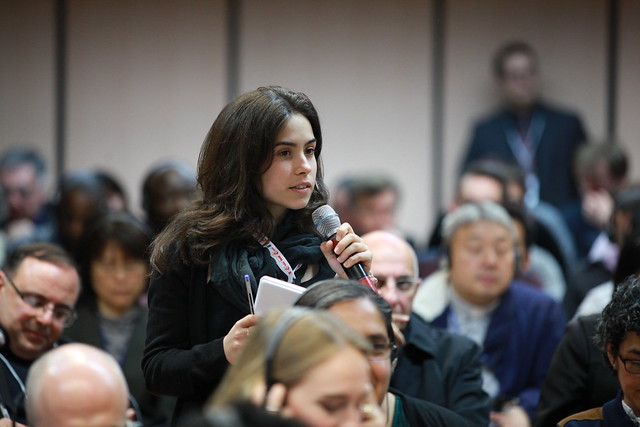#Krakow2Panama
The synod intends to involve young people and it is for the young people

The word “Way” connects the path of the World Youth Days—a worldwide pilgrimage that began thirty years ago—with the Synod of Bishops; now, the word Synod means “walking together.” The theme of the 15th Assembly of the Synod will be “Young People, the Faith and Vocational Discernment.” Naturally, therefore, the two parties involved: youth ministers and youth delegates from all the continents, have come to meet at the event organized in Rome these days by the Dicastery for the Laity, Family and Life.
The Secretary General of the Synod, Card. Lorenzo Baldisseri, introduced today’s work by telling about how, after a very wide consultation, Pope Francis chose the theme, explaining that the synod is not on young people (as subjects of study) or by youth (this is a Synod of Bishops), but it intends to involve young people and it is for the young people, whom the Pope calls, in the letter written on the occasion of the presentation of the preparatory document, to express and communicate their faith.
The document itself is only the beginning of a path of attentive listening to all the realities and of deep reflection; the results will be collected only at the end of the synodal itinerary.
An introduction to the preparatory document, presented last January, was presented by the Synod’s Secretary, Msgr. Fabio Fabene, who then followed the work throughout the day. “We also want to talk to those who are distant and indifferent—he said—showing them a Church that is caring for their present and their future. The young people involved in the church community must be missionaries and close to their peers through the forms and ways that you will propose to the dioceses of your countries.” Msgr. Fabene then described the methods of consultation and study that the Synod Fathers will use to get a better understanding of the situation of young people in the world, with the intention of involving young people, listening to them, and making them feel like real protagonists of the event.
Then the participants listened to a series presentations on national realities, with two round tables and many interventions of the delegates. A request came from the United States to present the preparatory document to young people in a creative way, including through the social media; in France, the theme chosen has been unanimously welcomed, and a number of diocesan initiatives were immediately launched, with the belief that collegiality is the form of the modern Church; in the Philippines, as early as March, local youth ministry leaders gathered for a a national meeting; for the Church in Australia, 2018 will be the year of the young; in Burundi, there are many challenges in the face of which expectations of a conscious, responsible, mature, and sincere faith are high. The Holy Land—which includes Israel, Jordan, and Palestine—the Catholics represent only 2% of the population, but they are very active and engaged in a creative ministry to bring young people to Christ “without taking possession of them;” finally, in Colombia, also a troubled and changing land, the Church is committed to responding to the problems of poverty, violence, and secularization.
In the afternoon, Mr. Alessandro Rosina, Professor of Demography and Statistics at the Catholic University of Milan and Synod consultant, presented the work done for the first part of the preparatory document, which concerns the analysis of the situation of young people today. Rosina emphasized in particular that “people are not young in the same way in all periods of history: the experience of being young today is unique and must be recognized as such. Furthermore, while the young share common traits throughout the world, there are also local features, and regions have their characteristics.” The Church—said Rosina—“must grow more attentive to the young and become a positive experience in their lives so that they may choose Her.” “We need audacious young people,” he continued, quoting Pope Francis, “who are aware that they are a value for the world.”
The delegates were then divided into working groups, according to their language areas, where they discussed in depth the themes suggested by the heads of the synod, to whom they will send a brief report. Holy Mass brought all the participants together at the end of the day, mindful, as Msgr. Fabene recalled in his homily, that “the encounter with Jesus is not the finish line, but the starting point for making their lives a gift.”
06 April 2017

Una Caro. In Praise of Monogamy
See below the statement by Cardinal ...
Read all >
WYD Seoul 2027 releases its Official Prayer
The Local Organizing Committee (LOC) for ...
Read all >
The John Paul II Youth Foundation towards WYD Seoul 2027
A concert evening promoted by the ...
Read all >
“As young people, you can be leaders of creativity and courage”
For the first time, the young members of ...
Read all >
